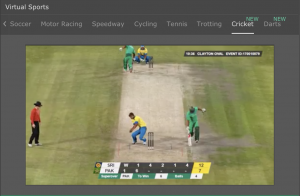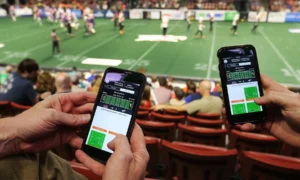It is an exciting time in the Virtual Sports industry at the moment. We know that Virtual Sports is the third most popular form of betting on sportsbook sites, behind soccer and horseracing betting alone, and we know that the market for Virtual Sports betting is growing rapidly, especially in comparison to more traditional sports betting markets.
Virtual Sports is the third most popular form of betting on sportsbook sites, behind soccer and horseracing betting alone, and we know that the market for Virtual Sports betting is growing rapidly, especially in comparison to more traditional sports betting markets.
Furthermore, we know from our research and recent articles that Virtual Sports-producing companies, such as Inspired, are looking at ways of developing the next generation of Virtual Sports games. This includes using live-action from specially filmed real life competitors as the basis for the ‘highlights’ package of a specific Virtual Sport. In addition, we are seeing an increase in the number of betting markets available across Virtual Sports, as well as an increase in quality in terms of presentation, commentary and graphics.
It is tempting to think that we are starting to see the next generation of Virtual Sports betting games and services come to the fore and I do believe that is the case, but I also think that we are still just scratching the service at what Virtual Sports betting can and will become in the future. So in this article, we are going to gaze into the Crystal Ball and take a look at the technological innovations that may well shape how the Virtual Sports betting of tomorrow takes shape and how different that could be to how we bet on Virtual Sports today.
Where are we with Virtual Sports now?
Currently, with most Virtual Sports offerings we are at the stage where we have a betting period of a few minutes, which then ends and is followed by the Virtual Sports game or event being simulated on screen.
betting period of a few minutes, which then ends and is followed by the Virtual Sports game or event being simulated on screen.
The next generation games have taken this simulation aspect of Virtual Sports and turned it from being entirely computer generated and created using graphics, into using real live filmed action of players, teams and individuals. This action is then spliced together randomly to produce a Virtual Sport event and to produce TV-quality highlights package. At present, this can be found on games such as Virtual Darts or Virtual Cricket, with Virtual Basketball set to follow suit later this year and plans for updated versions of Virtual Horseracing and Virtual Greyhound racing too.
As we reported last week, we are also starting to see a contextual element added to Virtual Sports, for example in Virtual Football, rather than having a series of random games that have no context in which they are played, new Virtual Football games will see the games be part of a competition, which allows for another level of betting on Virtual Sports and allows for data to be created for that competition, which punters can then use and analyse to help them formulate their next Virtual Sports bet, much as they do in real life.
I believe these two key developments will become more commonplace in Virtual Sports over the next 2-5 years, but what will happen when they have become the norm? What other technological innovations could make the future of Virtual Sports betting very different to what we see now?
What does the future hold for Virtual Sports betting?
It is hard to see how Virtual Sports betting can be improved still further assuming that the changes outlined above become commonplace over the next few years. However, I think the real change in the future of Virtual Sports betting will be not in making more of the Virtual aspect, but of tieing it in more with the Sports Betting side of things.
that the changes outlined above become commonplace over the next few years. However, I think the real change in the future of Virtual Sports betting will be not in making more of the Virtual aspect, but of tieing it in more with the Sports Betting side of things.
The first development which will be key to the next generation of Virtual Sports betting games will be 5G network services. Many telecommunications companies plan to roll out 5G services across the UK and other parts of the world throughout 2019 and this new benchmark for services will not only be able to carry much more data, but it should also be less prone to errors and issues and also much faster too.
The net result of this is that 5G will be allow people and companies to transmit much more data, much more quickly, to many more people more reliably. On its own, that doesn’t sound like a big deal, but in terms of future applications and iterations of Virtual Sports games, it could have a huge impact.
Personally, I feel the next big step for Virtual Sports betting will be to embrace the similarly named, but technologically different Virtual Reality services. I think many sports betting sites may eventually start to develop applications which take advantage of this technology, especially when it becomes cheaper and more widely available.
We have already seen, with the likes of the app Pokemon Go, how Augmented Reality can be used on mobile phones and tablets to allow people to interpose computer graphics and images over a real-world background. Virtual Reality takes that a step further by immersing the headset wearer in their own universe.
In terms of Sports Betting, you could eventually see Live Games broadcast to  Virtual Reality headsets where the person using the headset can view the game from any position in the ground, or even from the perspective of an official or even a competitor. You could then overlap these real-life images with augmented reality, allowing punters to bet on events from within their headset by selecting which markets etc they would like to bet on.
Virtual Reality headsets where the person using the headset can view the game from any position in the ground, or even from the perspective of an official or even a competitor. You could then overlap these real-life images with augmented reality, allowing punters to bet on events from within their headset by selecting which markets etc they would like to bet on.
Once this technology is completed, then adapting it to Virtual Sports would be very simple as instead of using real live games, companies could use the games and events that they already have, but present them in a Virtual Reality format. This would make the Virtual Sports more immersive and with the overlay betting on screen, people could bet very easily without the need for accessing things on a keyboard or mouse.
I can see how you access Virtual Sports betting changing in this way over time, but I also feel that the type of Virtual Sports betting available over the next ten years will change drastically. At the moment, Virtual Sports betting has not strayed too far from its basic sports betting model, but there is absolutely no reason why it could not develop other things to bet on away from sports. How about a Virtual General Election? A Virtual X-Factor game? Virtual Pop Charts?
Alongside that, I do see more Virtual Sports being developed over the coming years, with the more popular sports in the world today being the ones most likely to be adapted. So that may include Ice Hockey for countries like Canada, and parts of eastern Europe, Rugby Union and League for Australia, New Zealand, Great Britain and Ireland, France, South Africa and the like.
There’s no doubt that Virtual Sports betting has a huge future and it is going to be interesting to see how it all unfolds over the next few years. What is your money on in terms of being the next big development in Virtual Sports betting?






